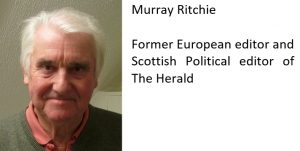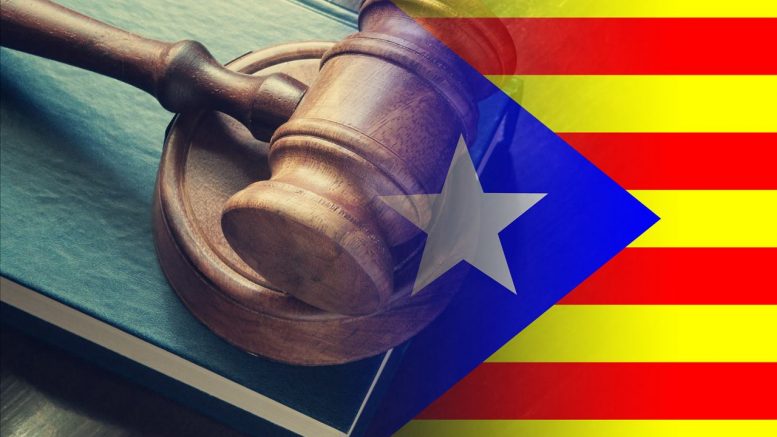Determined to deal directly and only with state capitals, the EU has always kept the regions at arm’s length, writes Murray Ritchie.
All across the European Union the “little people” are asserting themselves. Those nations that are not states and yearn for recognition – Catalans and Scots most immediately come to mind – are in the vanguard of this strengthening movement.
How long can Europe’s centrist nation states hold out?
The EU has always feared expressive regionalism. Catalonia’s declaration of independence has put this gathering force in the European spotlight as never before and thrown the EU into confusion as it ducks the flack for siding with its member nation states.
The pro-EU Scots received no help from Brussels in their independence referendum. Ditto the Catalans. The EU may be making friends among worried heads of state but it is stoking resentment among those of its own citizens pursuing autonomy or independence.
Determined to deal directly and only with state capitals, the EU has always kept the regions at arm’s length, afraid of the challenge to crude controlling centralism so beloved of most European governments.
The French have a saying: first there is Paris, and beyond there is nothing. This centrist dogma has been broken down in some EU states, not least in the UK, hardly a unitary state now with Scotland, Wales and Northern Ireland running devolved administrations.
Boris Johnson’s denunciation of Catalan separatism causes wry smiles and a little headshaking in places like Scotland
In Scotland, where Brexit is unpopular, voters have flirted with outright independence and will do so again if the ruling Scottish National Party has its way.
Scotland exemplifies the frustrations felt by regional pressure groups across the EU. With more than 60 per cent of Scots in favour of remaining in the EU rather than Brexit Britain, the pressure for change in an unpopular EU policy increases.
In the minds of Brussels Eurocrats, Scotland and Catalonia might as well not exist. They are mere regions to be denied any direct role in EU decision-making.
The same applies to England, Wales and Northern Ireland. Central government in London is the EU’s only point of formal diplomatic contact. Ditto in Madrid, Rome or any other capital with a restless region.
This obduracy is causing a pan-European backlash. Boris Johnson, the UK foreign secretary, personifies the problem.
Confusingly, as a leading Brexiteer and therefore separatist, he supports the EU in defying the independence of Catalonia or Scotland but wants to partition the UK and Brussels.
Boris Johnson’s denunciation of Catalan separatism causes wry smiles and a little headshaking in places like Scotland.
The law which Johnson and Spanish premier Mariano Rajoy insist must be respected is a self-serving rule of their own making which, arguably, might not even respect human rights. Whatever happened to the United Nations’ right to self-determination?
It seems only states can make laws that their own sub-nations must obey. Those who see themselves as nations – although stateless – must do as they are told or, in Catalonia’s case, face police truncheons and jail.
Johnson’s view stinks in some parts of Britain, particularly in much of Scotland with its strong sense of nationhood. Much the same applies in several EU states where their own minorities with constitutional ambitions are weary of domination by unsympathetic centrists.
Some years ago the EU began to recognise these frustrations and set up its cumbersome Committee of the Regions. The idea was to give regionalism a voice – but no power – requiring the EU institutions to take into account the views of the little people.
Can anyone outside of the Eurocracy truly think of any great advance in the rights of those voiceless?
But the little people are gaining ground. After years of campaigning the Scots voted overwhelmingly for a parliament with strong powers. Opponents condemned it as a “motorway to independence with no exits” and they might one day soon be proved correct.
This follows a pattern. In Belgium whenever there is a political crisis the central government cedes more power to the regions, particularly Flanders with its strong element of Catalan-style independistas.
Like the Catalans the Flemish resent their economic success being exploited to the benefit of central government. There is an echo in the UK where the income from oil in Scottish waters was ruthlessly exploited by Westminster to bankroll the Thatcher revolution while Scotland itself received nothing beyond its per-capita share of the proceeds.
The Scots’ and Flemings’ experience is typical. Just ask the Basques in Spain or the better-off regions of northern Italy or the Corsicans of France.
So where is all this leading?
Well, if those sub-state nations have their way they will one day have their own seats at the top table of a reformed EU. This is not fantasy. It is a goal perfectly realisable in time. Equal status with the nation states to which they belong or as independent entities means confederation.
The EU would no longer be the federal quasi-state that some wish, but instead a grouping of equals. A confederal Europe of the peoples would break down control by nation states and, for example, solve the Irish border problem.
Scotland’s indignation at being dragged out of the club by its Brexit big brother would be assuaged. Independence offers Scotland an escape route from Brexit.
Together, the Catalans and the Scots and the rest could be starting to reshape the EU – which is why its centrist member states, so complacent in recent years, are now sniffing an alarming wind of change.






The trouble is, Murray, nation states are always mixtures of more and less wealthy regions and peoples. If the those with the good fortune to have the wealth demand that they keep it and do not share it, the world becomes an even more dysfunctional place in which the richer get an ever larger share than the poorer. Wise leadership is needed to ensure that wealth and rights are equitably shared and that populations understand why this is necessary. What is missing almost everywhere now is wise leadership.